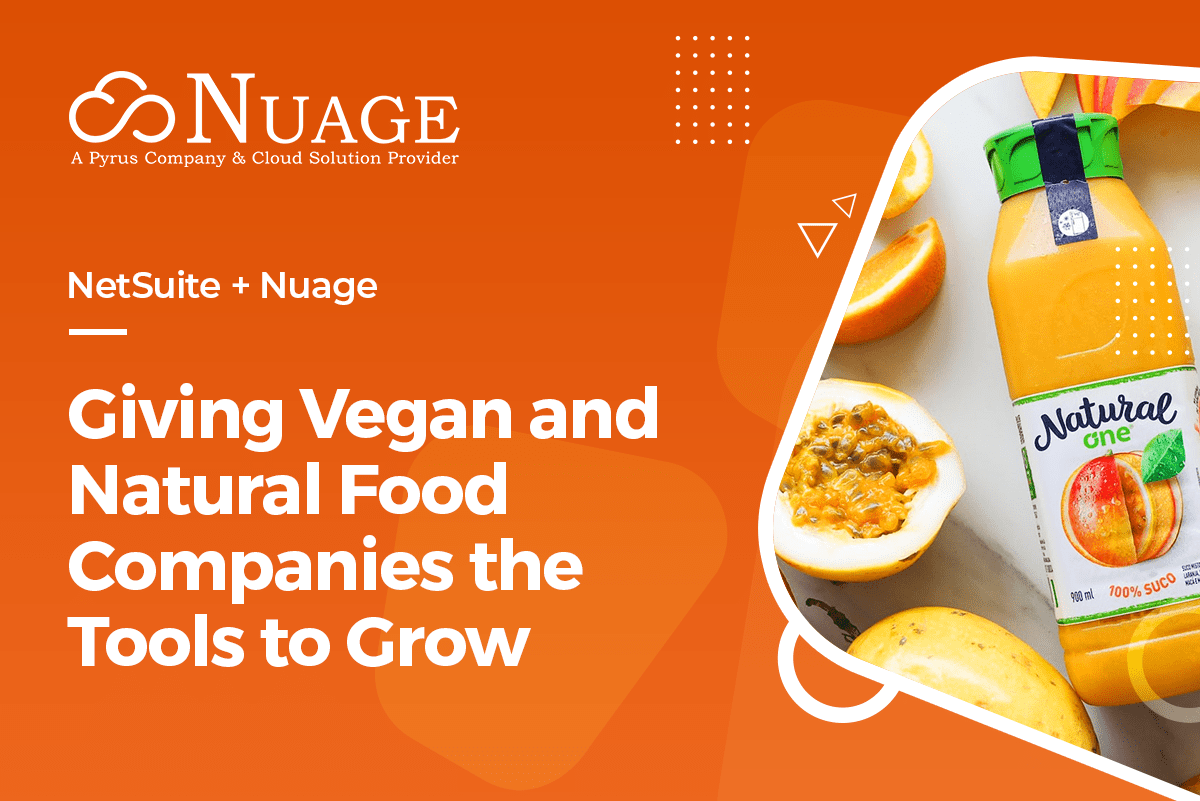An increased emphasis on proactive self-care, the shift to more product personalization and a growing focus on natural resource preservation are some of the key trends that are keeping natural and vegan food and beverage producers, distributors and retailers busy right now.
Well positioned to support these trends, these companies are riding the wave of renewed awareness of how what we put in our bodies impacts our lives.
Credit the more health-conscious, environmentally-aware consumer with driving most of these changes. “With life-changing challenges facing the population, including global warming and a severe and sweeping pandemic,” Advanced Biotech points out, “the definition of healthy eating has expanded to embrace our personal health and the health of others, animals, and the planet itself.”
Big interest in natural and vegan options
As individuals look for new ways to improve their well-being, vegan and natural food manufacturers are stepping up to the plate to help. Wall Street has also been paying attention to the shifts, with both venture capital and private equity firms making substantial investments in food companies that are focused on healthy food and drink alternatives.
According to Motley Fool, companies like Beyond Meat and Oatly both command multibillion-dollar valuations; packaged food companies like Tyson Foods are launching their own vegan brands; and startups like Impossible Foods want to go public. As they shed their startup costs and mature, these companies often find themselves held back by the technology that they put in place at the outset.
“Natural food and beverage companies are getting substantial investment from outside investors who want insights into the companies’ financials,” said Louis Balla, VP of Sales at Nuage, a NetSuite Services Partner that’s worked with natural food companies with annual revenues ranging from $5 million to $65 million.
Most of those organizations start by outsourcing the entire co-packing or co-manufacturing process to a third party. Once they receive funding, they have to be able to produce the goods at a larger scale, get the products into retail channels and sell them online. This requires fast scale and a robust software infrastructure that most startup food companies don’t have.
“A lot of these organizations come to us seeking that infrastructure and better insights into their internal processes,” said Balla. “They also need technology that allows them to continue leveraging their co-packers/co-manufacturers and gives them the insights they need to keep their boards and investors happy.”
This white paper explores the rapid growth of the natural food sector, highlights some of the technology challenges companies face when they hit growth mode and explains how a unified cloud enterprise resource planning (ERP) solution plus a few industry-specific optimizations can help companies gain better operational visibility, meet their stakeholders’ financial reporting requirements and earn more on every sale.
Helping them out of Excel hell
The vegan and natural food trend is underway and doesn’t look to be slowing down anytime soon. Plant-based diets have increased 300% in the US over the last 15 years, and global retail sales of plant-based food alternatives may reach $162 billion by 2030 (up from $29.4 billion in 2020). If the projections are on target, the plant-based food sector would make up 7.7% of the global protein market by 2030.
More mindful eating, the need for better immunity support, a rise in home cooking, interest in “functional” beverages (e.g., plant-based, organic and immunity-boosting options) and better understanding of the cancer-diet link are all pushing more consumers to buy and try more organic and natural options. Growing demand for vegan food options is also supported by grassroots movements like “Meatless Mondays” and “Veganuary,” the latter of which is a global challenge to go vegan for the month of January.
Many of the companies providing the food and drink to support these trends are using basic systems like QuickBooks for financial management, DEAR Systems’ ERP and applications like Fishbowl for inventory management. Most hang onto these systems until the solutions no longer support their growth, and despite the fact that sharing data requires many spreadsheets and much manual intervention.
“Most of the food and beverage companies we’ve worked with were all trapped in Excel hell,” said Balla, “and needing to get out of it in order to keep growing, scaling and meeting the expectations of their investors and other stakeholders.”
Scaling up quickly
For the company that got its start raising edible crickets for human consumption or making jerky out of mushrooms, having to increase production and distribution in response to consumer and/or investor demand can be a shock to the system. This is exactly what’s happening across the natural and vegan food sector right now as consumers look for alternative food options and Wall Street follows them down that path.
Having worked with numerous high-growth natural and vegan food companies, Nuage helps them leverage all of NetSuite’s native functionalities while also providing several optimized workflows designed specifically for these types of companies.
The first workflow leverages NetSuite’s landed cost module to help companies accurately determine their margins on specific items. It automatically calculates the production, shipping and sales costs as they are incurred, and gives companies accurate retail sales prices. Companies can then attribute the landed costs across their entire customer base—a capability made possible by Nuage’s optimization of NetSuite’s landed cost module. This helps them improve their margins and increase their profitability.
Nuage also helps connect food and beverage companies with their contract manufacturers, co-packers, third-party logistics companies and other outside partners that can collaborate effectively on NetSuite—something that wasn’t possible with basic solutions and spreadsheets.
For example, a natural food manufacturer that procures raw material from the Asia Pacific region (APAC) or South America will send those goods right to their co-packers or co-manufacturers in order to speed up the supply chain.
Using NetSuite commands, manufacturers can maintain good visibility over that inventory and track the related profitability.
“With NetSuite commands, companies get much better access to what the contract manufacturers are doing and better insights into the data, the process and the cost,” said Jake Holm, Business Development Manager at Nuage. “They know whether they’re getting the best bang for their buck and the best value (versus relying on co-manufacturers to supply the data).”
Equipped with these insights, food and beverage companies can quickly assess their outsourced operations, decide whether or not they are profitable, and then replace any arrangements that aren’t living up to expectations.
NetSuite also helps growing food and beverage companies pivot quickly when needed. This is particularly critical in an era when outside investors are taking an increased interest in the vegan and natural food sector, where new Wall Street darlings are sprouting up all over. The cloud ERP also supports internal pivots, including the introduction of a new functional beverage or the extension of an existing snack line.
“NetSuite does a very good job of facilitating these moves and giving organizations the ability to test out new product iterations or align with a new co-packer or co-manufacturer,” Holm explained. “Much like any other organization, the focus for natural and vegan food companies right now is on making good decisions in real-time; that’s why we’re seeing so many of them choose NetSuite over any other software that’s available on the market.”
An easy pivot to NetSuite
For the food or beverage company that’s using QuickBooks and spreadsheets and wants to move to NetSuite, the shift is fairly straightforward thanks to the established SuiteSuccess methodology. With a target implementation time of 100 days or less, SuiteSuccess provides the framework and tools that companies need to begin using the reports, dashboards and workflows illustrating how they can grow based on best practices.
“Investors and banks are impressed that we have ERP,” said Josh Jaspan, COO of Hank Sauce, a hot sauce manufacturer, that moved from Quickbooks to NetSuite with Nuage, “and we are thrilled we were able to go live in three months.”
Hank Sauce, like many rapidly growing food and beverage companies, needed a larger line of credit from their bank, and they were only able to meet the institution’s reporting requirements because they had NetSuite in place. Product expansion was top of mind for Hank Sauce’s NetSuite implementation. They have begun selling their sauces in Whole Foods due to the Lot Number tracking capability within NetSuite. Other companies report faster inventory turns, fewer manual steps, improved automation, and better supply chain management at a time when the latter is crucial for companies across most industries.
Using NetSuite’s manufacturing resource planning (MRP) capabilities, companies can also hone their demand and supply chain planning right in the native application. With NetSuite, companies can more effectively forecast their requirements and leverage good demand planning, neither of which are well supported by QuickBooks, DEAR or Excel.
Set it and forget it
As the natural food sector continues to expand, the organizations operating in it will need robust software platforms that allow them to do more with less at a time when human labor has become extremely difficult—and expensive—to recruit, hire and retain.
“NetSuite is an employee that works for your company 24 hours a day, every day and doesn’t take off for holidays or sick days,” said Holm, who estimates that the ERP effectively offsets the cost of 2-3 full time employees per year, for a total of $250,000-$300,000 in savings.
NetSuite also helps companies manage uncertainty at a time when new disruptions seem to be lurking around every corner. Once in place, the ERP will scale with the food or beverage company for the next 5-10+ years without needing to be replaced or upgraded (aside from the two annual, predictable upgrades that happen automatically).
“I don’t think anyone expected food and beverage to blow up like it did during the pandemic, with consumers ordering crickets from home because they wanted to try something new or because they were bored,” said Balla, who has seen companies in the sector grow from $10 million to $100 million in annual revenues over a 2-year period. “NetSuite gives them the ability to implement an ERP one time and not have to worry about enterprise software for a long time.”


